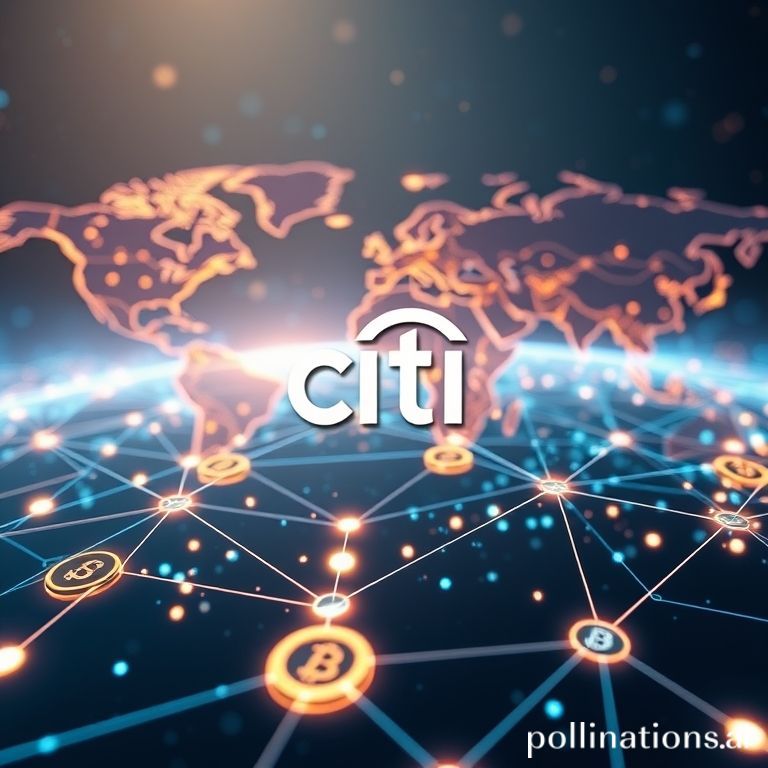Citi's Blockchain Token Platform Powers 24/7 Cross-Border Payments

In a significant stride towards modernizing global financial infrastructure, Citi has announced the integration of its cutting-edge blockchain-based token services platform with its established clearing solution. This strategic move is poised to revolutionize cross-border payments, offering institutional clients an unprecedented capability for 24/7, multibank instant transactions. This development underscores Citi's commitment to leveraging innovative technology to meet the evolving demands of an "always on" global economy.
The Dawn of 24/7 Cross-Border Payments
Citi's integration aims to create a seamless, real-time payment experience, initially targeting institutional customers in the United Kingdom and the United States. This innovative solution, touted by Citi as an industry first, addresses the traditional limitations of banking hours and geographical boundaries, paving the way for truly instantaneous financial flows across borders. The underlying blockchain technology provides a secure, transparent, and highly efficient framework for these tokenized transactions, ensuring speed and reliability.
Transforming Institutional Transactions
For institutional clients, the implications of this integration are profound. Businesses and financial institutions can now execute cross-border payments at any time, eliminating delays associated with conventional clearing systems. This capability is critical in today's interconnected world, where market movements and business operations often extend beyond traditional working hours. The ability to manage liquidity and settle transactions instantaneously offers a significant competitive advantage, reducing operational friction and optimizing capital utilization.
Leadership Insight into a Digital Future
Debopama Sen, Citi's head of payments, services, highlighted the imperative for such innovations, stating, “In an increasingly ‘always on’ financial landscape, global commerce doesn’t take weekends off and neither should payments.” This sentiment encapsulates the strategic vision behind Citi's efforts: to align its services with the continuous nature of modern global trade. Sen further elaborated on the solution's impact, noting its capacity to enable corporate and financial institutions to move millions of dollars in mere seconds, thereby fundamentally reshaping the pace of international commerce.
Leveraging Citi's Global Network for Instant Liquidity
The integration significantly enhances Citi's extensive real-time 24/7 network. It empowers corporate and financial institution clients to initiate payment transactions and manage their liquidity almost instantaneously, not just within Citi accounts but also across non-Citi accounts globally. This expansive reach ensures that the benefits of speed and efficiency are broadly accessible across the financial ecosystem.
Broadening Reach and Impact
Citi's 24/7 USD Clearing solution already supports active transactions for over 250 banks across more than 40 markets. This robust infrastructure forms the backbone upon which the new token services integration builds. Consequently, end-clients of these connected banks gain round-the-clock access to Citi's network. Moreover, multinational corporations can now facilitate rapid, 24/7 transfers to their suppliers and third parties who hold accounts within Citi's growing 24/7 USD Clearing network, streamlining global supply chains and vendor payments.
Future Horizons for Global Expansion
While the initial rollout is focused on the U.S. and U.K. markets, Citi has articulated clear plans for a phased global expansion of this service. This forward-looking approach indicates a long-term strategy to establish a pervasive, real-time cross-border payment standard across various international jurisdictions, furthering the global adoption of efficient digital financial services.
Expanding Digital Reach: The Dandelion Payments Partnership
This recent integration follows another significant development from Citi: its partnership with Dandelion’s digital wallet network. This collaboration extends Citi’s cross-border payment capabilities by enabling institutional customers using Citi’s WorldLink Payment Services to send near-instant, full-value payments directly to digital wallets worldwide, with near 24/7 availability.
Bridging to Digital Wallets
Initially, this capability has been rolled out in key emerging markets including Bangladesh, Colombia, Indonesia, and the Philippines, with further expansion anticipated. This strategic move allows Citi to enhance its offerings to financial institution clients, particularly in the remittances sector, by providing a faster and more cost-effective method for sending funds directly to end-users' digital wallets. For corporate clients, it unlocks new avenues for efficient business-to-consumer (B2C) payments.
B2C Payments and Beyond
The integration with digital wallets addresses a burgeoning need for flexible B2C payment solutions. This encompasses a wide array of use cases, from employee payouts such as payroll and expense reimbursements, to the distribution of social benefits, customer refunds, and compensation payments. Furthermore, it facilitates more seamless and rapid transfers to freelance and gig-economy workers, who often rely on digital platforms for their livelihoods. This capability not only improves the speed of transactions but also significantly enhances financial inclusion in regions where digital wallets are prevalent.
Strategic Implications for the Future of Finance
Citi's dual strategy of integrating blockchain-based token services with its clearing infrastructure and partnering with digital wallet networks represents a comprehensive approach to modernizing global payments. These initiatives collectively foster greater efficiency, transparency, and accessibility in financial transactions. By embracing blockchain technology, Citi is positioning itself at the forefront of digital finance, preparing for a future where value can be exchanged instantaneously across any border, at any time.
The move towards 24/7, real-time clearing and tokenized payments has broader implications for liquidity management, risk reduction, and operational costs. It empowers businesses to operate more dynamically, responding to global market conditions without the constraints of traditional banking hours. As more financial institutions adopt similar strategies, the global financial landscape is set to undergo a profound transformation, characterized by unparalleled speed and interconnectedness.
Conclusion
Citi's latest innovations in integrating its token services platform with its clearing solution, complemented by its digital wallet partnerships, mark a significant milestone in the evolution of global payments. By providing 24/7, near-instant cross-border capabilities, Citi is not only enhancing its service offerings but also contributing to the development of a more efficient, inclusive, and responsive global financial system. These advancements reaffirm Citi's role as a pioneer in financial technology, actively shaping the future of how money moves across the world.
